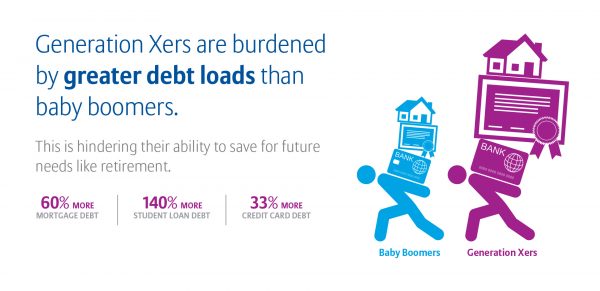And Generation X is screwed.
A report by Allianz Life paints a harrowing picture where owing debt has become a way of life for both Gen Xers and Baby Boomers but with the former paying a much bigger price in the long run.
It seems that living with debt has become a way of life for both Generation X and baby boomers as the stigma associated with owing money is gradually disappearing. What is replacing it is an acceptance of debt as just something that comes with life, the report highlights the issue in America but it is indicative of a far larger problem facing all of the West.
Baby boomers and Generation X are facing their financial future with nearly half (48%) of both generations agreeing that credit cards now function as a survival tool and 43% agreeing that “lots of smart, hardworking people who are careful with spending also have a lot of credit card debt.”
Alarmingly, this growing comfort with debt may be having a greater effect on the retirement plans of Gen X. Twice as many Gen Xers (27% versus 11% of boomers) say they are either unsure about when they plan to retire or don’t plan to retire at all.
The study of 2,000 Americans, including 1,000 baby boomers between the ages of 49-67 and 1,000 Gen Xers (ages 35-48) examined the financial attitudes and current finances for each generation, including total household debt. The study found that Gen Xers are carrying 38% more in mortgage debt (average of $144,000 versus $90,000 for boomers) and 45% more in non-mortgage debt, comprised of student loan debt (average of $12,000 versus $5,000 for boomers) and credit card debt (average of $8,000 versus $6,000 for boomers).
While one reason that Gen Xers have higher debt may be related to earlier use of credit cards – more than three-quarters (76%) of Gen Xers got their first credit card at age 18-24 versus 68% of baby boomers – the bigger concern is how they currently use credit to finance their lifestyles. Nearly half (46%) of Gen Xers said they revolve their credit card balances (only paying a portion each month) compared with only 32% of boomers. Without doubt, this strategy is having a negative effect on their ability to save for the future as more Gen Xers (23% versus 19% of boomers) said they believe “you can’t save for retirement until you pay off credit cards.”
“Over the last three decades, there has been a collective shift in how people view debt – it’s now perceived as a normal part of one’s financial experience and that has fundamentally altered the way people spend and save,” said Katie Libbe, Allianz Life vice president of Consumer Insights. “If Gen Xers continue to delay saving for retirement until they are completely out of debt, their nest egg is clearly going to suffer. For Gen Xers who are behind on saving, better debt management, with a focus on credit card spending, should be the first issue they address to get back on track.”
Dealing with Debt
Tackling the debt issue will likely be a significant challenge for many Gen Xers. More than a third (36%) of Gen Xers in Allianz Life’s study said they currently have more than $5,000 in credit card debt and a quarter admitted to carrying more than $10,000. In addition, 15% of Gen Xers said they also owe money to their parents. More than four in 10 (41%) Gen Xers say they are not comfortable with the amount of debt they have, while just a quarter of boomers reported feeling uneasy with their debt.
The increasing comfort/acceptance of living with debt makes a behavioral change from Gen X in the near future seem unlikely, meaning many Gen Xers will have less money available for savings and will miss out on decades of compound interest. In addition to carrying more credit card debt and debt in general, more Gen Xers are seeing debt as a necessary way of life. One in five Gen Xers believe that going into debt to handle day-to-day purchases is “just a fact of life” versus only 14% of boomers.
These attitudes are also evident in how each generation approaches long-term financial planning. When asked which financial philosophy they preferred, half of Gen Xers said “enjoy and live for today” versus only 39% of baby boomers, with the majority of boomers (61%) choosing “save and plan for tomorrow.” Accordingly, nearly three-quarters (73%) of boomers said they are clear about how much money they will need in retirement versus only 52% of Gen Xers.
“Although many Gen Xers are facing an uphill battle when it comes to saving for retirement, the good news is there is still time for them to change their bad debt habits,” added Libbe. “By taking a few simple steps like regularly tracking their spending and avoiding any new debt, burdened Gen Xers can take a significant step toward building a more successful financial future.”








